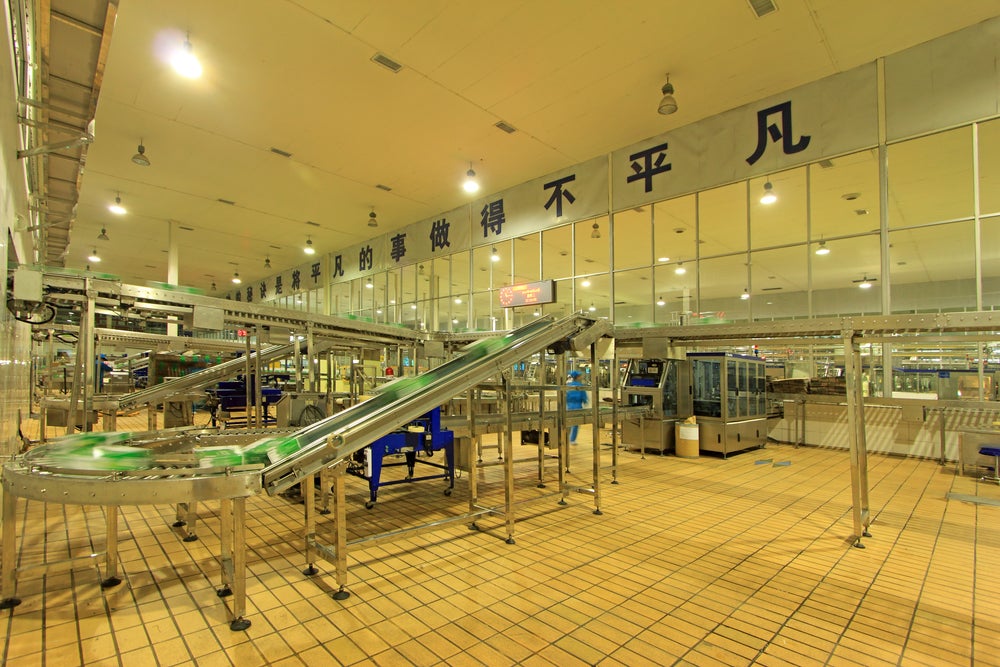As the West looks to decouple from China, companies must assess the best destination to relocate production and find new suppliers to build supply chain resilience.
GlobalData’s Supply Chain Disruption report discusses some alternative manufacturing destinations for companies looking to decouple from China.
The world’s manufacturing hub
During a period of exponential annual GDP growth, China ingrained itself in global supply chains from materials sourcing to end products. Strong economic growth, increases in labour costs, and a shrinking population have somewhat lessened the appeal that first made China an attractive manufacturing destination.
More recently, China has also become a major target of decoupling efforts. The US-China trade war is increasing the regulatory and reputational risks of doing business in China and more and more companies are relocating their manufacturing to countries that carry less geopolitical risk.
Depending on a country’s physical infrastructure, workforce, and existing industrial environment, a company can choose to move supply chain operations back to its home country, a nearby country, or a politically and economically allied country.
Latin America can provide highly skilled workers for US software companies
Argentina, Brazil, Colombia, Costa Rica, and Mexico have highly educated workforces and strong engineering talent with expertise in cloud, AI, and cybersecurity. Companies outsourcing to Latin America can benefit from a large pool of talent, low labour costs due to lower average wages and very high inflation, and proximity to the US in terms of time zone and location. In December 2023, Oracle launched a new public cloud location in Bogotá, Colombia. Tesla has also proposed building a manufacturing plant in Monterrey, Mexico, with new vehicle production starting as early as 2026.

US Tariffs are shifting - will you react or anticipate?
Don’t let policy changes catch you off guard. Stay proactive with real-time data and expert analysis.
By GlobalDataSoutheast Asia is in the ideal position to absorb companies exiting China
Investment in infrastructure improvements, lower labour costs, and favourable demographic trends place Southeast Asian countries in an ideal position to absorb manufacturing companies exiting China.
Malaysia already accounts for 13% of the global chip packaging market, with the likes of Micron, Bosch, Analog Devices, Jabil, and ASE expanding their assembly and packaging capacity in the country. Intel is also investing $7 billion to build its largest packaging facility in Penang.
In 2023, Vietnam and Thailand saw a 32% and 72% year-on-year increase in value in FDI, according to Vietnam’s Foreign Investment Agency and Thailand’s Board of Investment. Both Western and Chinese companies are major investors in these countries. With lower manufacturing costs, Vietnam and Thailand are ideal alternative manufacturing destinations and are still geographically close to not cause major disruptions with suppliers still based in China. In January 2024, Apple supplier GoerTek announced it would invest up to $280m to establish a subsidiary in Vietnam, following another $280m investment in a new plant in the country earlier in 2023.
A complete decoupling from China will remain impossible
The Chinese government’s long-term plan to make China self-sufficient anticipated the importance of emerging technologies to the future global economy and invested billions into digital and clean energy technologies.
Today, cheap Chinese supply completely dominates the solar panels, batteries, and electric vehicles markets. A fast and cost-effective energy transition will rely on Chinese supply chains, making a complete decoupling from China virtually impossible.









